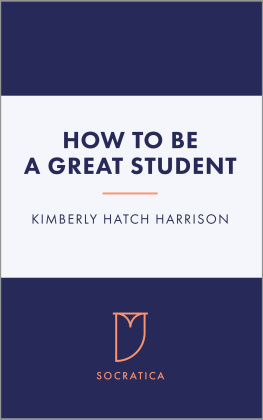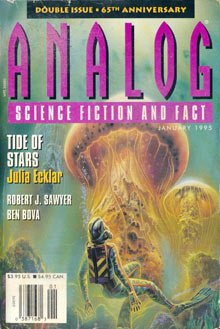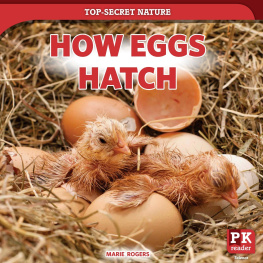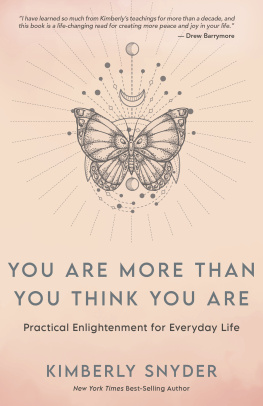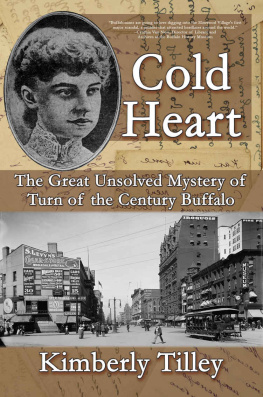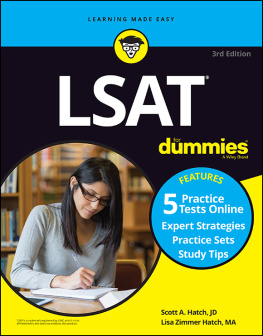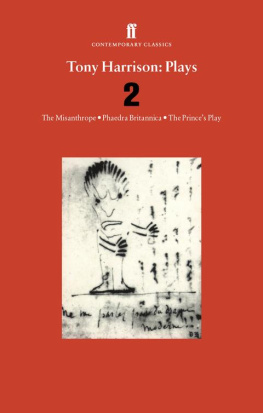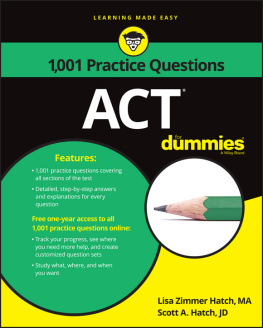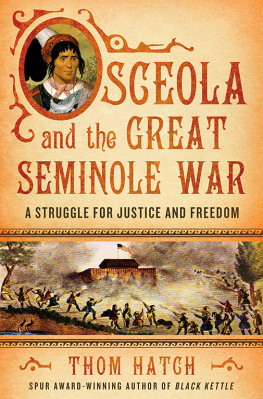Kimberly Hatch Harrison - How to Be a Great Student
Here you can read online Kimberly Hatch Harrison - How to Be a Great Student full text of the book (entire story) in english for free. Download pdf and epub, get meaning, cover and reviews about this ebook. year: 2021, genre: Religion. Description of the work, (preface) as well as reviews are available. Best literature library LitArk.com created for fans of good reading and offers a wide selection of genres:
Romance novel
Science fiction
Adventure
Detective
Science
History
Home and family
Prose
Art
Politics
Computer
Non-fiction
Religion
Business
Children
Humor
Choose a favorite category and find really read worthwhile books. Enjoy immersion in the world of imagination, feel the emotions of the characters or learn something new for yourself, make an fascinating discovery.
- Book:How to Be a Great Student
- Author:
- Genre:
- Year:2021
- Rating:5 / 5
- Favourites:Add to favourites
- Your mark:
- 100
- 1
- 2
- 3
- 4
- 5
How to Be a Great Student: summary, description and annotation
We offer to read an annotation, description, summary or preface (depends on what the author of the book "How to Be a Great Student" wrote himself). If you haven't found the necessary information about the book — write in the comments, we will try to find it.
How to Be a Great Student — read online for free the complete book (whole text) full work
Below is the text of the book, divided by pages. System saving the place of the last page read, allows you to conveniently read the book "How to Be a Great Student" online for free, without having to search again every time where you left off. Put a bookmark, and you can go to the page where you finished reading at any time.
Font size:
Interval:
Bookmark:
How to Be a Great Student
By
Kimberly Hatch Harrison

For my teachers.
Table of Contents
Chapters
- (aka Smart Test Prep )
- (Bonus PandemicTime Chapter)
INTRODUCTION
S o. I wasnt always a great student. Dont get me wrong, I went to all the best schools, and I got all As for a long timelike 10 straight years. But it wasnt because I was studious. I was just a really smart kid. That was me getting by on cleverness.
This is the story of how I eventually hit a brick wall and had to learnfasthow to actually study.
How did I do so well in school? I read obsessively from an early age. I also loved puzzles, and so I always did well on a certain kind of test. My whole life, I was off the charts on all the standards like the Stanford-Binet, the ISEE, the SAT, the GRE. With very little effort, correct answers would flash into my mind. It was easy for me to coast until I found myself, at age 13, at one of the best college prep schools in the country.
For the first time in my life, I was asked to think about what I was studying. I should put studying in quotes, because up until that time, I really didnt do any proper studying at all. All through grammar school, I sat in class, causing no trouble, trying to avoid getting teased, and then wrote whatever I wanted on tests. Somehow I was always correct.
I showed up at my swanky, elite prep school freshman year and was immediately in over my head. I had NO idea how to manage my time, write essays, prepare for testsnone of it. I was unprepared and ineffective in class, never knowing what was coming next. Id occasionally copy down what was on the board, but I never reviewed my notes. I would turn in homework completed at the last minute. I crammed for every test.
Dont get me wrongI wanted to do well, really I did. Id sit for hours staring at my textbooks, willing the information into my head. Sometimes Id do well; sometimes I wouldnt. I had no idea how to influence the whole experience. For the first time I realized what it meant to struggle academically.
One of my teachersGod Bless You Eric Steltertook pity on me. He saw me trying to cram chemical formulas by brute force into my unpracticed brain the day before a test in his class. I had no idea how long it would take me to study for the test, or how to know if I was actually learning the material. I thought it was pure chance how well I would do on his test the next day.
He took my chemistry book from me and flipped to the Practice Test at the end of the chapter (why didnt I know to look there?) and said these magic words:
Only study what you DONT know.
Following his instructions, I took the practice test, got a 50%, and only reviewed the questions I missed. I took the test again, and got about 85% correct. I reworked those last tricky questions one more time, and the next day I got a 100% on the real test.
First technique learned: Only study what you dont know , by using a practice test. I call it Smart Test Prep . I learned the rest of the tips in this book the hard way, by doing absolutely everything wrong. I used the slowest, most painful, most inefficient ways to study, until I figured out much better methods. These saw me through the rest of prep school and college. I have 15 tips to share with you in this book.
If you read one chapter a day, youll become a Great Student in just a couple weeks.
Eric Stelter is no longer with us. But Im here to pay it forward. This is what Ive learned about how to learn.
Kimberly Hatch Harrison
Los Angeles, California
CHAPTER ONE
How to Prepare Your Study Space
I m Generation X, a Latchkey Kid raised by Silent Generation parents. My hard-working mum was an immigrant to this country who ran her own small clothing store without any help (not counting me, after school and on the weekends). My father spent his days driving back and forth across Los Angeles as a chauffeur. In other words, my parents were busy doing their own thing. Its not really possible for my parents to have been less involved in my studies when I was a kid. It wasnt just my parents who were hands-off, either. Remember, this was pre-Helicopter Parents, pre-Tiger Moms, pre-Soccer Moms. There was a clear divide between the Adult World and the Kid World, and as far as my parents were concerned, school was part of the Kid World. They had no inclination to be in the PTA, or help me study, or give me advice about college. So it seriously BLEW MY MIND when I went over to a friends house one day and the first room I walked into was...
The Study Room.
Thats right. This family had turned their entire living room into a dedicated place for their kids to study. Maybe thats normal in certain circles, but I had never dreamed of such a thing. I gaped. I really did. I turned around open-mouthed, just like in the movies, taking it all in. There was a big clean table in the middle of the room with a bowl of fresh oranges. There was a computer station. Bookshelves with hardcover reference books. There were maps for studying geography on one wall, and diagrams of how to write Chinese characters on another. It was basically a classroom, right there, taking up a quarter of their house.
I learned something that day that Ive never forgotten. Its one thing to say education is important to you. But are you living your life that way? If someone walks into your home, or looks at your dorm room, is it clear at first glance that education is a priority for you? Forget for a minute what anyone else thinks about your housewhat sort of message are you sending yourself ?
If you are really serious about being a Great Student, you need to create a productive workspace that lets you focus on your studies.
First question: Where? Not everyone has an entire room in a house at their disposal. If space is an issue, dont worry. Your study area doesnt have to be big. It just has to be dedicated . Really, all you need is a table and a chair.
But I like to study lounging in bed , you say. Youre wrong , says I. Thats how I used to study, before I went over to Amy Wongs house and my eyes were opened to the error of my ways. Your bed is for SLEEPING. I have insomnia, and I certainly wasnt doing myself any favours by doing homework in bed. Also, just look at yourself, slumped over, sitting on papers. This is bad for your back and bad for your papers.
Pick a quiet space in your roomaway from the door and away from the window, if youre on a loud, busy street. The goal is to minimize distractions. Measure how much space you have, and then find a simple sturdy table and chair that fits the space. Doesnt have to be fancy or even new. Check the local Goodwill and Craigslist. Dont feel like you have to buy something sold specifically as a desk. Any sturdy table will do. When I was in grad school, I bought myself a cheap picnic table. It gave me enough room to spread out all my papers, and even have a place for my whole study group to work together.
Once you have your desk in place, decide what you need to put on it. Your computer or laptop, of course. But what else? Remember, this is a special place just for studying , so resist the temptation to start using it for your mail and laundry and dirty dishes and other things you need to put away. The organizational expert Marie Kondo says you need just a few categories of items on your desk: Books, Papers, Miscellaneous Items, and Sentimental Objects.
Books
You should only have the books you need for your current classes on your desk. Everything else should be put away on a bookshelf. If youre not sure whether youll need a certain book, put it away. If it turns out you have to go get it while studying, leave it at your desk. Its earned a spot there.
Next pageFont size:
Interval:
Bookmark:
Similar books «How to Be a Great Student»
Look at similar books to How to Be a Great Student. We have selected literature similar in name and meaning in the hope of providing readers with more options to find new, interesting, not yet read works.
Discussion, reviews of the book How to Be a Great Student and just readers' own opinions. Leave your comments, write what you think about the work, its meaning or the main characters. Specify what exactly you liked and what you didn't like, and why you think so.

